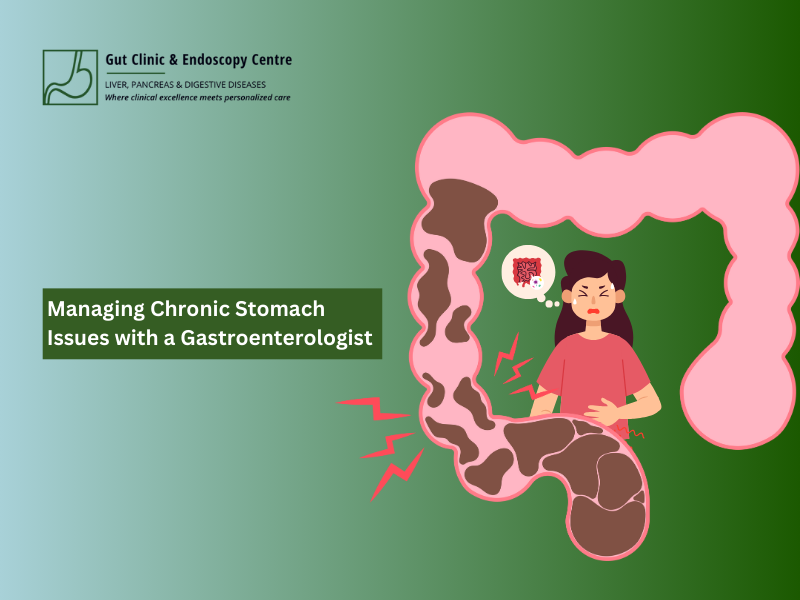

For appointments call:
(99997) 40985


Do you often experience stomach pain, bloating, heartburn, or other digestive discomforts that interfere with your daily life? While occasional digestive troubles are common, persistent symptoms lasting weeks or months could indicate chronic stomach issues. These conditions can significantly affect your health and quality of life, making it crucial to seek medical attention.
This article explores chronic digestive problems, their symptoms, causes, and the importance of consulting a gastroenterologist for proper diagnosis and treatment.
Chronic stomach problems refer to long-term digestive disorders that require continuous management. They can present in various ways, from frequent heartburn to severe abdominal pain, affecting millions of people worldwide. Conditions such as acid reflux, irritable bowel syndrome (IBS), and inflammatory bowel disease (IBD) are among the most common digestive issues that people face.
Chronic digestive issues may cause symptoms such as:
These symptoms can range from mild to severe and often disrupt daily activities, work, and social life. The unpredictability of flare-ups can also cause stress and anxiety, leading individuals to avoid certain foods and activities.
Ignoring ongoing stomach problems can lead to serious health complications. For example, untreated acid reflux may cause conditions like esophagitis, Barrett’s esophagus, or even esophageal cancer. Similarly, unmanaged inflammatory bowel disease can result in bowel obstructions or an increased risk of colon cancer.
Seeking medical help early can prevent these conditions from worsening. Gastroenterologists specialize in identifying and treating chronic digestive disorders, helping to manage symptoms and reduce the risk of complications.
Several digestive disorders can cause long-term symptoms. Below are some of the most prevalent conditions:
GERD occurs when stomach acid repeatedly flows back into the esophagus, leading to heartburn, chest discomfort, and regurgitation.
IBS is a functional gastrointestinal disorder that causes abdominal pain, bloating, and changes in bowel habits. It is categorized into:
These are open sores that form in the stomach lining or the upper part of the small intestine, often resulting in burning pain, nausea, and vomiting.
IBD includes conditions like Crohn’s disease and ulcerative colitis, both of which cause chronic inflammation of the digestive tract. Symptoms include persistent diarrhea, abdominal pain, weight loss, and fatigue.
If you experience persistent digestive symptoms, a gastroenterologist can help determine the underlying cause. Here’s what the diagnostic process typically involves:
The doctor will take a detailed medical history, asking about symptoms, diet, medications, and lifestyle factors. A physical examination may also be performed.
Based on your symptoms, a gastroenterologist may recommend:
Since different digestive disorders can share similar symptoms, a gastroenterologist carefully analyzes test results to provide the most accurate diagnosis.
Once a condition is identified, the doctor will create a personalized treatment plan that may involve medications, dietary changes, and lifestyle adjustments.
Treatment depends on the specific digestive disorder:
Identifying and avoiding trigger foods can significantly reduce symptoms. Eating a fiber-rich, balanced diet and avoiding processed foods also helps improve digestion.
Regular exercise
Stress management (meditation, yoga)
Avoiding smoking and excessive alcohol consumption
Because chronic stomach conditions require long-term management, routine check-ups with a gastroenterologist help adjust treatment plans and monitor any changes in health.
A gastroenterologist specializes in diagnosing and treating digestive disorders. They offer:
Chronic stomach issues can be challenging to live with, but with the right care, they can be managed effectively. Gastroenterologists play a vital role in diagnosing, treating, and supporting patients with these conditions, ensuring they receive the specialized care they need. If you are experiencing chronic stomach problems, don’t hesitate to seek help. A consultation with a gastroenterologist could be the first step towards better health and a better quality of life.
If you're experiencing persistent digestive problems, don't hesitate to schedule an appointment with a gastroenterologist. Early intervention is fundamental to effective management and preventing complications. At Gut Clinic, our expert gastroenterologists will help you understand the underlying cause of your condition and curate a personalized treatment plan. Contact us today and start your journey towards optimal gut health.